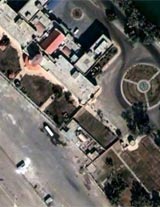 Online games have a particular problem dealing with player death.
There has to be some risk, some consequence for losing a
fight. But harsh penalties have a way of making for unhappy customers,
so the trend over time is to make the penalty smaller and
smaller. Dying in World of Warcraft has almost no consequence at all,
and WoW players mostly just laugh when they get killed.
Online games have a particular problem dealing with player death.
There has to be some risk, some consequence for losing a
fight. But harsh penalties have a way of making for unhappy customers,
so the trend over time is to make the penalty smaller and
smaller. Dying in World of Warcraft has almost no consequence at all,
and WoW players mostly just laugh when they get killed.
Eve Online takes a very interesting alternate approach. If your spaceship is destroyed in a battle, you lose the ship. It's gone, blown up, as is most of your cargo and ship fittings. (A bit is left behind for a pirate to scavenge.) It's pretty punitive, although it's not so bad for newer players as the cheaper ships can be insured. But for a seasoned player in a HAC with faction modules the cost of losing their ship is quite significant. The result? Ship to ship battles mean something. When you lose your ship, it smarts. And it's quite a pleasure to kill a pirate and loot his fancy engines and guns. The significance of death means the game is more intense. Eve also has a very clever game dynamic that makes dying even more exciting: your pod. When your ship is blown up you, personally, don't die. You eject in an escape pod. And your pod is in the battlefield, a very vulnerable and juicy target. If you're fast you can usually get your pod out before you're blown up, but it's intensely stressful. Because now you're dying a second death, a more real one because it's you, not just your spaceship. Clever idea. Sadly, I've stopped playing Eve Online. Because as brilliant as the game is, it's not fun for me. The politics, economics, player created content are all fantastic. But the core game mechanics of spaceships shooting each other just isn't very good. Takes too long to find a fair fight and the fight is over too quickly. But I'll miss the joy of winning a fleet battle and destroying our enemy's materiel and the adrenaline fear of being attacked by a pirate and just barely escaping with my ship on fire.
Flickr started as a side project from a high concept
online game that was really an
excuse to socialize and collect things. The photo thing took and the
Flickr guys were smart enough to cultivate a success when they found
it, but games still pop up inside Flickr from time to time.
Users are the ones inventing Flickr games now. I just noticed a new
one, a variety of "your photo is
good" badges people put in the comments of photos like this
one. Flickr Gold
lets you give out gold medals after you get one, Flickr Poker and
High Five let
you hand out several awards a day and accrue kudos to photos with lots
of awards.
Sort of a carebear version of an old Flickr game, deleteme.
These games seem a bit silly, but I think people really like this kind of tokenization. It's not enough to say "this photo is good", the ritual of collection and the structure of game rules makes it seem more significant for people. The statistics are the most interesting webmaster tool for me. They show you how Google is crawling your site, how user queries lead to your site, and what keywords Googlebot is seeing on your pages. For instance, I learned today that I get a lot of clicks for the query pee jokes. I'm #2 on Google for that highly valuable term, although I think #1 would be more appropriate. The webmaster tools also give you diagnostics for when Googlebot has problems. The Crawl rate shows you how many requests Googlebot is making (3 megabytes a day!) and gives you the option to slow it down. The crawl errors are cool too, particularly for finding robots.txt problems. The above tools show you what Googlebot is doing; sitemaps lets you help it along. A sitemap is a simple text document that lists all the URLs on your site. Great for dynamic sites with hard-to-crawl pages. This file is understood by all three major search engines, so it's well worth the effort to create one. It's like aliweb all over again!
I really wanted to like Second Life. I'm a big game nerd, I like player
created content, and I'd love to dabble programming in an MMOG myself.
I even have friends who work at Linden. But I tried Second Life
out a year or so ago and the client was just
terrible. And creating content was too hard. So
after a few hours I quit.
Second Life has been the benefactor of a lot of hype, so I suppose it's predictable that when the backlash comes it's spiteful. But behind Valleywag's poisonous editing are some thoughtful articles by folks like Clay Shirky. The recent piece calling the SL economy a pyramid scheme (better in its longer form) is quite interesting. One of Second Life's unusual features is you can convert their virtual currency back to real dollars. There are many ephemeral stories of people claiming to make real money from their second lives. Only, maybe, it's not true. Randolph Harrison claims that you can't really take out more than a couple of hundred US dollars without getting gouged on the exchange. It's a problem in every online game I've seen; there's some notional exchange rate of virtual currency to real currency, but the reality is you can't get much real money out. Why? Because there are only a few market makers who aren't particularly interested in seeing actual dollars go out the door. The difference with Second Life is that currency brokerage is legitimate, not underground. Interesting that it doesn't seem to work, either. I'd like Second Life to be successful, but at this point Linden has a credibility problem. They need to release some real, believable numbers about population size and economic activity. Or back off the hype. I only have one personal friend whose MySpace page I know about. But occasionally I end up there to gawk at unfortunate demi-celebrities, notorious murder suspects, or other odd collections of people. And as soon as I hit the MySpace page I'm assaulted with visual and sonic chaos. The vernacular of MySpace design is certainly colourful, but my eyes defocus and I just can't understand it. This must be what jazz sounded like to my great-grandparents. Incomprehensible. Even when I've had the patience to get beyond the overwhelming chrome, MySpace pages are still confusing. There's a thing on the page called a "blog" but the posts require clicking on to read and are generally meaningless. Pages have lots of badges of identity (music, movies, heroes) but they always seem vapid or random. The only content I've seen on a MySpace page that actually does tell me something is the comments from friends. For example, I think my friend on MySpace is now engaged; she doesn't say so on her page, but the pseudonym I think is her boyfriend made some comment that sounded like they were engaged. Maybe. Huh? It's partly generational, but I wonder if my real problem in understanding MySpace is I'm not an active participant. A lot of the MySpace UI is invitations to get deeper in, send a message, make my own page, list someone as my friend. Maybe if I did that and became part of the MySpace social fabric I'd get it better. Interesting: media you have to participate in to understand.  The Bush administration conceded to the Constitution today, agreeing to no longer
illegally conduct wiretaps without FISA oversight. Well, maybe,
they're vague about just how much oversight the judges will provide.
Blanket warrants, anyone?
The Bush administration conceded to the Constitution today, agreeing to no longer
illegally conduct wiretaps without FISA oversight. Well, maybe,
they're vague about just how much oversight the judges will provide.
Blanket warrants, anyone?
But don't misinterpret this; attorney general Gonzales assured us they still have deep contempt for the Consitution. Gonzales said federal judges are not "equipped to make decisions about" actions the president takes in the name of preserving national security. "A judge will never be in the position to know what is in the national security interest of the country."Indeed, what do any of us know about what is going on in Guantanamo? Secret gulags have a way of being opaque.  Consumer routers are bad hardware. Does someone make a small wireless
router that's not a piece of junk? In four years I've had three of
these things burn out on me. A Netgear RT314 (flaked out), a Linksys
WRT54GS v1.1 (crippling software problem) and now, a Linksys WRT54G
v2.2. The last one had about a year of service before it flaked out.
First the wireless was unreliable, then two days later it reset itself
entirely every few minutes.
They're entirely solid state, what's to fail? Maybe overheating?
Consumer routers are bad hardware. Does someone make a small wireless
router that's not a piece of junk? In four years I've had three of
these things burn out on me. A Netgear RT314 (flaked out), a Linksys
WRT54GS v1.1 (crippling software problem) and now, a Linksys WRT54G
v2.2. The last one had about a year of service before it flaked out.
First the wireless was unreliable, then two days later it reset itself
entirely every few minutes.
They're entirely solid state, what's to fail? Maybe overheating?
This time around I bought a Buffalo router. It claims to support MIMO and 6x the Wifi range, whatever the hell that means. The software and manual are awful. 20-70 second random delays on every configuration change, a 1980s era Chinese bitmap font, weird things like port mapping being called "Internet gaming configuration". But it works. Instead of $70 for a router that sucks and will break after one year, I'd gladly pay $150 for a good router. Does that market exist?
Update:
Marc
points out that Apple's
Airport Extreme
is about what I'm asking for. $180.
 Tuesday is the big release day for the Burning Crusade expansion for
World of Warcraft. It's the first real expansion for the game since
its release more than two years ago. And there are 8 million people
playing WoW. It's a big deal.
Tuesday is the big release day for the Burning Crusade expansion for
World of Warcraft. It's the first real expansion for the game since
its release more than two years ago. And there are 8 million people
playing WoW. It's a big deal.
The expansion is a huge game balance gamble. Traditional RPGs have a problem: you only have so many employees and so much content. So after the players have levelled up and advanced and played all your content, what do they do until you can ship an expansion? The usual solution is to slow the players down, make them replay the content you have. Warcraft does this admirably with a huge amount of gameplay at level 60. Hard dungeons with finicky boss fights that take months to learn, 50+ hour reputation grinds, PvP minigames, etc etc. All gameplay that gets players to happily work for weeks for powerful rewards. The level 60 game works so well that many serious players consider levelling from 1-60 as a mere prelude to the real game. But Burning Crusade upsets this careful balance. Now 60 isn't the end, there's new content and levelling from level 60 to 70. Which is great, but that progression is only going to take people a few weeks. And then what? It's not really clear that the old level 60 gameplay is going to scale well to level 70 players (although they are trying). Presumably there will be a new grind at level 70, but will players go for it? Particularly after the bitterness of seing their hard-earned level 60 loot so quickly obsoleted? It's a big gamble, but I bet it will work. Blizzard are masters at scaling the rewards for players, and I suspect the new grind at 70 will probably just seem like new fun for everyone. We'll know in three months if it works.
George W. Bush is a compromised president. There's no
reason to believe
anything
he says about Iraq. But
we're stuck with him for two more years. And the only
thing the Democratic opposition is saying is "bring the troops home".
While I'd certainly like to do that very soon, we have a significant
problem. We broke Iraq. We destroyed its government, its
infrastructure. Now we're stuck with it. We have both a moral
obligation and a personal security interest in Iraq.
But what can we do? The usual solution to this problem is to give up and ask the international community to help. UN peacekeepers, international debates, etc. But we have no friends here, we blew that when we lied to the UN and then defied their direct resolutions and invaded Iraq anyway. Our only ally in this is Britain, and they're just as compromised as the US. We are well and truly stuck. This debacle is why you don't start wars under false pretenses.
I don't get all the excitement over the iPhone. Well, I do get it: Apple
Marketing is very good at creating hype and Apple does build
good products. But what's so exciting about the iPhone?
The best analysis I've seen so far is this comparison matrix. What I learned from that is the iPhone is about as big and heavy as a Treo and does about the same things with a better camera and screen. And for that you pay $300 more and are reportedly locked into a two year Cingular contract. Is that so exciting? The screen does look good, although I'll want to see it in person in bright sunlight before getting too excited. But after it's all scratched and smeared with sebum? And my friend FJ!! points to a potential serious flaw; touchscreens give you no tactile feedback. It'll be pretty, but will it be a good phone? Maybe we'll finally get a humane cell phone interface.
This fall I wrote 39 blog
posts about restaurants in Paris. Here's the
places I thought were particularly good or worth returning to. None of
these are the best restaurants in Paris, but rather are chosen for
their comfort and the care of the staff.
|
||






